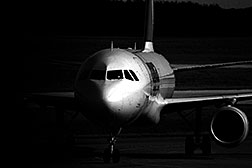- Number 390 |
- June 10, 2013
The science of long-distance travel: Making jet fuels from renewable sources

Airplanes are the most demanding
application for biofuels, because of the
cost of the engines and the requirement
that the fuel be incredibly reliable.
You might not routinely think about jet fuel, but the cost and reliability of this common fossil fuel is critical to both America’s economy and defense. And even as our Nation focuses on alternative energy, electrifying jets is not practical due to the required energy density, space limitations, and retrofitting costs. A better alternative is to create jet fuel from plant-based materials, such as specially grown crops or agricultural waste, that works in today’s energy infrastructure.
And that is the focus of scientists at DOE’s Pacific Northwest National Laboratory and their research collaborators. “Airplanes are the most demanding application for biofuels, because of the cost of the engines and the requirement that the fuel be incredibly reliable – you don’t want to have fuel problems at 30,000 feet,” said Dr. Robert Weber, the Operating Officer of PNNL’s Institute for Integrated Catalysis.
At the Institute, scientists are studying several different methods to create bio-based jet fuel, including pyrolysis, a technique that uses heat to create aromatic or cyclic hydrocarbons — key components of jet fuel. The efficacy of this fuel was demonstrated by Boeing, UOP and DOE’s Biomass Program when it was used to power an unlimited hydroplane, which uses a jet propulsion similar to that in airplanes.
Researchers are also analyzing commercial and custom catalysts and processes that upgrade intermediate alcohols to energy-dense jet fuel. To become part of the aviation fuels industry, the catalysts, which drive the reaction, and the processes must be affordable, efficient, and effective.
“One of the challenges is the very rigorous standards set by the Federal Aviation Administration, because the plane – quite literally – is designed around the engine’s thrust,” said Dr. Roger Rousseau, a PNNL computational chemist leading this fundamental research.
At a new pilot-scale facility in Richland, Wash., PNNL scientists are demonstrating a route to jet fuel that creates alcohol intermediates from synthesis gas, which is a mixture of carbon monoxide, hydrogen and carbon dioxide. The process uses a designer catalyst to upgrade the alcohol intermediates to fuel. At the new facility, Richard Hallen and his colleagues are studying the process and synthesizing the fuel samples required for testing as part of the FAA's certification process.
“The remaining hurdles are the cost and availability of biomass sources,” said Hallen.
The bio-based research at PNNL benefits greatly from strong collaborations and capabilities. Scientists at the national laboratory have ongoing partnerships with researchers across academia and industry. Also, the researchers collaborate with peers and use resources at EMSL, DOE’s Environmental Molecular Sciences Laboratory, a national user facility packed with experimental and computational resources. In addition, researchers also benefit from the resources and collaboration at the Bioproducts, Sciences, and Engineering Laboratory. Known as BSEL, this joint PNNL and Washington State University facility offers a range of capabilities, including bio-reactors up to 60 liters and catalytic reactors with 1- to 100-cc catalyst bed size, with specialty reactors that have up to a 1-liter catalyst bed. These instruments allow long-term catalyst testing and production of small quantities of products.
However, the national lab’s bio-based research goes far beyond bio-derived fuels, as the Wall Street Journal’s 2012 Technology Innovation Award shows. Archer Daniels Midland and PNNL received the award for commercial deployment of a process that converts renewable feedstocks into propylene glycol, a chemical commonly made from petroleum.
To learn more about PNNL’s work in bio-based aviation fuels, check out our video.Submitted by DOE’s Pacific Northwest National Laboratory
